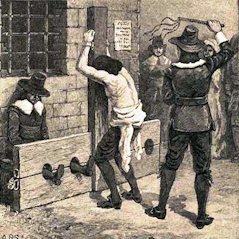
|
Some Common Myths Thought to be True - Myth 143
Myth 143: Puritans Left Europe to Escape Religious Intolerance
Particularly in the years after 1630, Puritans left for New England, supporting
the founding of the Massachusetts Bay Colony and other settlements. The
large-scale Puritan emigration to New England ceased by 1641, with around
21,000 having moved across the Atlantic. This English-speaking population in
America did not all consist of original colonists, since many returned to
England shortly after arriving on the continent, but produced more than 16
million descendants. This so-called "Great Migration" is not so-named
because of sheer numbers, which were much less than the number of English
citizens who emigrated to Virginia and the Caribbean during this time.
|
| Puritans | |
|
The Puritans of the Massachusetts Bay Colony were the most active of the New
England persecutors of Quakers, and the persecuting spirit was shared by the
Plymouth Colony and the colonies along the Connecticut river. In 1660, one
of the most notable victims of the religious intolerance was English Quaker
Mary Dyer, who was hanged in Boston for repeatedly defying a Puritan law
banning Quakers from the colony. She was one of the four executed Quakers
known as the Boston martyrs. In 1661, King Charles II explicitly forbade
Massachusetts from executing anyone for professing Quakerism.
|
|
| ⇦ Back to Myth 142 Return to Myth Choices Page 10 On to Myth 144 ⇨ | |